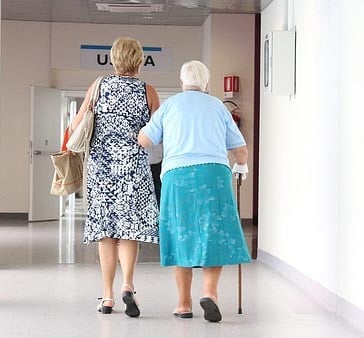
By the year 2050, it is estimated that 20 percent of all Americans will be at least 65 years of age, with the most growth occurring among Americans aged 85 and older. According to the 2010 census, about 5.8 million Americans were over the age of 85, and this number is expected to reach 19 million people by 2050. With the growing number of elderly patients and staff shortages in the medical field, there is an increasing cause of concern related to the quality of care for elderly patients and residents.
Nursing home abuse is what can, unfortunately, happen to any residents under the care of a licensed care facility. There are different types of abuse. The most common types of abuse are physical, sexual, emotional, or financial. This abuse often happens in plain sight, and can often be overlooked. It can be caused by a staff member at the facility, or even other residents living there.
Nursing home abuse is a severe issue at facilities across the country, with neglect being considered one of the most common forms of abuse.
6 Signs of Neglect
Negligence occurs when a person does not receive the proper level of care he or she needs. This level can vary depending on the individual case, but for nursing home residents, it often includes basic hygiene, assistance with eating, and help with mobility.
When a nursing home fails to provide proper care, residents can suffer significant physical and psychological damage. Knowing the signs of neglect can help to prevent or stop it before your loved one suffers greatly. Although the signs can vary depending on the case, and one indicator alone does not necessarily point to neglect, a combination of the following could raise red flags and cause for concern:
1. Poor personal hygiene –
When caring for nursing home residents, nurses, and other staff are expected to aid with basic personal hygiene. Many residents need help with getting dressed, brushing their teeth, clipping their nails, bathing, combing their hair, and more. When a person is neglected, they are left to do these things on their own and often incapable of doing so.
2. Unsanitary living conditions –
Nursing homes are required to provide residents with safe and clean living conditions. Failing to do so could indicate they are being neglected. According to federal law, nursing home facilities must “establish and maintain an infection control program designed to provide a safe, sanitary, and comfortable environment in which residents reside…” They also must meet state requirements for safety and security.
3. Physical issues from lack of nutrition-
Neglect also can lead to physical problems like malnutrition and dehydration. Whether caused deliberately or through lack of oversight, poor diet affects millions of people in nursing homes across the country.
4. Loss or lack of mobility –
Mobility is often a challenge for nursing home residents. A proper nursing home will make sure staff helps residents move around, exercise, and remain as active as possible. Many facilities use walking programs to build muscle tone and strength, improve circulation, increase balance and reduce spasms and contractures,
If a person is neglected, he or she may be left in bed for long periods, risking a loss of all mobility. Without routine movement, residents can also face other health issues, such as bedsores and infections.
5. Unexplained injuries –
Things like broken bones, bruises, or head injuries could be a significant indicator that abuse or neglect is taking place. People who do not receive the help they need may attempt to do things for themselves. That may be as simple as walking somewhere unassisted, which can lead to falls or other preventable injuries.
According to the Centers for Disease Control and Prevention (CDC), about 1,800 older adults living in nursing homes die each year from fall-related injuries. The average nursing home resident falls 2.6 times each year. Those who survive frequently become permanently disabled and are left with a reduced quality of life. Although not all of these incidents are caused by neglect, the CDC lists several things nursing homes can do to help prevent falls, such as reviewing prescribed drugs to assess their risk, installing grab bars and better training their staff.
6. Psychological issues –
Neglect, like other forms of abuse, can cause several emotional problems for elderly residents. They may become afraid of the caregivers and reluctant to talk about the issues they face or may become angry or resentful. Sometimes, residents grow distant from friends and family, close themselves off, and even suffer from depression. All of the emotional changes should be taken seriously and should be addressed immediately.
What does the Law State?
South Carolina has a Bill of Rights for Residents of Long-Term Care Facilities. In this Bill of Rights, it states that at the time of admission, each resident shall be informed of the ‘facility’s services, charges, and the ‘facility’s refund policy. It also states that the ‘resident’s guardian has the right to choose a personal attending physician, participate in planning care, and must be informed of any changes to the ‘resident’s care or treatment. When it comes to the resident, the Bill of Rights states that each resident must be free from mental and physical abuse, as well as free from any chemical or physical restraints except those ordered by a physician. The ‘resident’s possessions must be stored in a secure location free from any damage or theft. They are to be treated with dignity and respect and assured privacy during personal treatment. Under no circumstance whatsoever should a patient be refused treatment based on their sex, race, color, religion, national origin, or source of payment.
In May of 2014, S.C. Senate Medical Affairs Committee passed a legislative bill to allow residents of nursing homes to install electronic monitoring devices in their room. This was passed due to the high statistics of elderly abuse and neglect. The committee thinks that by allowing the residents to install their monitoring system, this will lower the chances of abuse and neglect taking place inside of the nursing home facility.
What You Can Do to Help
Be an advocate, ask questions, and check out the facility with the South Carolina Department of Health Services. It keeps records as to each facility, including how many times a facility has been cited and for what. If you suspect abuse or neglect, contact the department and file a complaint. It is obligated by law to come out and inspect the facility. Talk to an attorney. Frequently, that is the only way that nursing homes can be held accountable for abuse and neglect.
The best way to prevent your relative from falling prey to nursing home neglect is your presence. Nursing home residents who are frequently visited by family, friends, and loved ones are simply less likely to be neglected in part because their loved ones are more likely to notice the early stages of neglect and take action before things can become more severe.
When visiting your relative, check for the above listed symptoms of neglect and keep an eye out for potential red flags like an understaffed facility (if no one ever seems to be at the desk and it takes an eternity to find someone who works there, the odds are good your relative is having a hard time finding staff, too).
If your relative seems to be confused or troubled, speak to them. Frequently residents are worried about causing “trouble” or “being a bother” and have difficulty voicing their concern.
Read More: What Should You Do If Your Elderly Parent Is Injured In A Nursing Home
If you suspect your loved one is being neglected in a nursing home facility, don’t hesitate, speak with one of our experienced Personal Injury lawyers today.
At Bluestein Attorneys, it’s our mission to help you ensure your rights are protected. If you’re dealing with potential nursing home neglect and you’re concerned about what steps to take next, we’d be happy to speak with you!
During your free consultation, we’ll speak with you about your unique situation and help you and your family decide what next step is right for you. Reach us by phone at (803) 674-8820 or contact us online at any time.



